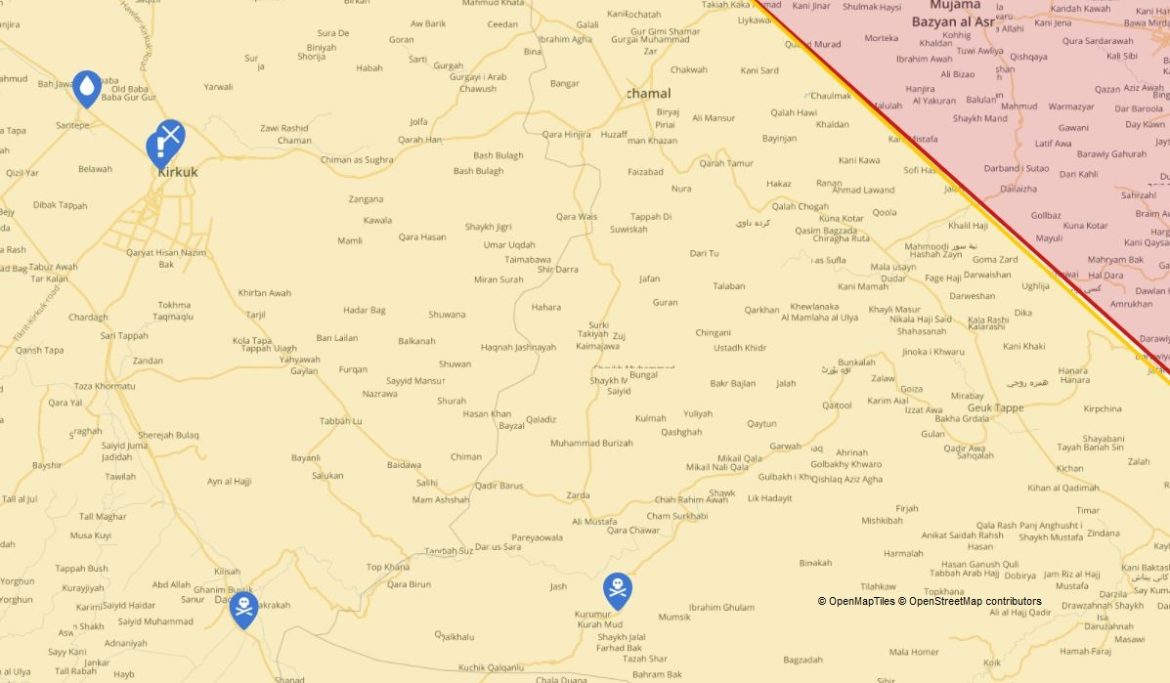1.3K
Kirkuk
- Three rocket attacks between June 22nd and June 24th targeted the Khor Mor gas field south of Chamchamal district. The Gas field is operated by the UAE’s Dana Gas Company and supplies gas to power plants in the Kurdistan Region. Though no side claimed responsibility, Iranian-backed militias remain the main suspect as Iran’s Revolutionary Guards and its proxies have launched several similar attacks on Erbil. It was initially reported that the missiles were fired from Khurmatu district, specifically in the village of Qalganlu, but later the investigation report revealed new information on the origin of the attacks. There were no human casualties reported but fires did break out at the facilities. Following the attacks, both the Peshmerga forces and the Iraqi army were mobilized against each other. The Kurds feared the Iraqi military taking advantage of the attacks and occupying the fields. So far, no military clashes have occurred, but the forces are on alert against each other, and the Iraqi army insists on advancing towards the Koromor field. On June 26, Dana Gas suspended all operations in the area and moved all foreign staff to the center of Sulaimani. On the same day, June 26, a high-level Iraqi military delegation arrived at Halwa airport in Tuz Khurmatu district and met with Peshmerga commanders. According to the latest leaked information, the Iraqi delegation asked the Peshmerga to withdraw from the checkpoint and hand it over to the army, but the Peshmerga refused. UAE’s Dana Gas has operated the Khor Mor field since 2007. Observers also link the attacks on the field to Iranian opposition to the newly Kurdistan Regional Government (KRG) agreement to export natural gas.
- On June 26th, ISIS (Da’esh) terrorists raided the Samud village in the southern Daquq district and kidnapped two siblings while farming. Da’esh terrorists released one of them on the same day, and the fate of one remains unknown. Moreover, On June 25, Shakhawan Abdullah, Deputy Speaker of the Iraqi Parliament, said that the administrative procedures for the establishment of a joint Peshmerga and Iraqi forces division “have been completed,” and they are working to “fulfill the obligations of the federal government as soon as possible.” The “20th Division” will deploy in the disputed territories consisting of Kurdish and Iraq Forces, agreed upon last year.
- On June 26th, the German Corporation for International Cooperation (GIZ) held a conference in Kirkuk in partnership with Iraqi organizations titled “Kirkuk, a city of peace and coexistence,” which was the last activity of an eight-month project on “coexistence” in Kirkuk. However, the conference banners and presentations were only in Arabic, ignoring other components in the province, such as Kurds, who are the majority, and Turkmen and Christian minorities in Kirkuk. Local activists raised the issue over social media. Still, in response, Milan Ali, one of the local organizers, said they chose the Arabic language since it’s official in Iraq. The Kurdish language is the second formal language in Iraq, recognized in the constitution. Activists demanded apologies from the German and local organizations.
- Amid the continuation of the fuel crisis, On June 27, the Iraqi oil ministry decided to close 121 unlicensed private gas stations in Kirkuk. The ministry claimed that the gas stations are “unlicensed.” There are 69 other private gas stations in Kirkuk. Separately, in a statement, the Human Rights Committee of the Iraqi House of Representatives said some “influential administrators” in the administration pressure employees “by using illegal methods in order to obtain personal benefits, by exploiting their administrative, security or political positions.” Dozens of corruption cases have been filed against Kirkuk officials since October 16, 2017.
- The State-owned Oil Products Distribution Company replaced two senior positions occupied by Kurds with an Arab and a Turkman in the most recent campaign against the Kurds. The two positions, accounting and distribution directors, are the latest of Baghdad’s striping Kurds from power. More than 125 government posts in Kirkuk have been given to non-Kurds since October 16, 2017.
Tuz Khurmatu
- On June 19, a team from the Ministry of Oil visited Tuz Khurmatu’s Chaladwana and Milasar. The delegation of technicians went to inspect the area and its suitability for working in the oil fields. Before October 16, 2017, two oil companies operated in the villages for five years and withdrew. The two villages are located in a vacuumed security zone between the Peshmerga and Iraqi forces.
- The dean of the Khurmatu College of Education has been demanding the opening of a Kurdish language department in the college for three years, but the University of Tikrit has prevented it. The presidency of Tikrit University said due to the lack of teachers for the department, they cannot open the Kurdish college. However, staff and faculty have been prepared, and the decision has been political against the Kurds in the area.
Shingal (Sinjar)
- On June 30, the Iraqi mass grave excavation team began excavating six mass graves in Sinjar. The process of excavating the graves began with religious ceremonies. The graves are located in the village of Qene in Sinjar. About 210 bodies are expected to be found in the six graves belonging to victims of ISIS atrocities in 2014.
- On June 30th, a leader of the Yazidi House was killed inside his house. The deceased was identified as Jamil Sulaiman, a leader of the Yazidi House, a movement established in Sinjar in 2018. The incident occurred late at night in his apartment. The Yazidi House presents itself as a different movement and is against Shingal Resistance Units (YBS) and the KRG.

